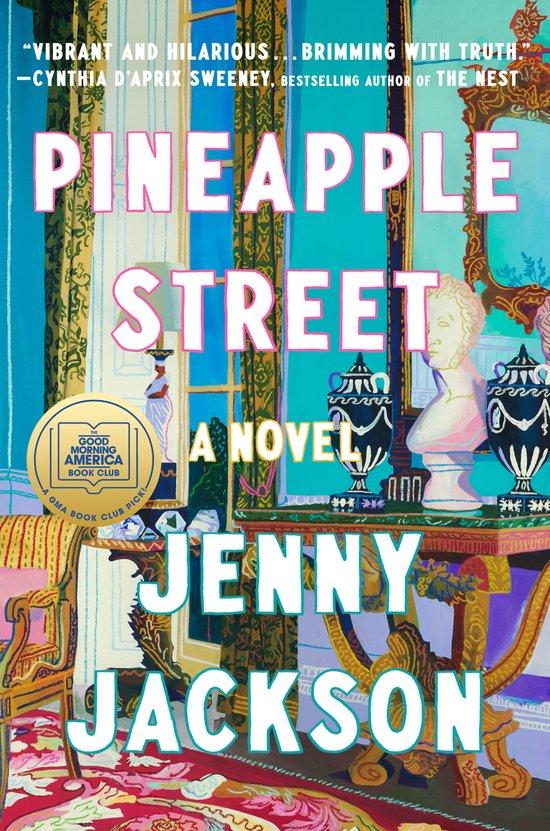Pineapple Street van Jenny Jackson is de ideale post-Succession-roman.
Het gaat over een gezin uit een New Yorkse-vastgoeddynastie.
De millennial-kinderen Georgiana, Darley en Cord worstelen alle drie op verschillende manieren met hun rijkdom.
Twee door huwelijkse voorwaarden, één door een diepgeworteld schuldgevoel over haar trust fund waarvan alleen al het liquide gedeelte 37 miljoen dollar waard is.
In een decor van keurige tennisclubs, strandhuizen, privéscholen, banken en majestueuze brownstones volg je hoe ze met zichzelf in het reine proberen te komen.
Vol heerlijke Successionesque cringe momenten, bijvoorbeeld wanneer vrienden de schoondochter voor een serveerster aanzien omdat ze net de verkeerde kleding aan heeft:
“Oh, I’m Sasha,” she says, as a guest tries to hand her an empty glass. “Thank you, Sasha,” the guest replies, cheerfully.
En dit is natuurlijk een juweel van een uitroep:
“Oh no, I left my Cartier tennis bracelet in Lena’s BMW and she’s leaving for her grandmother’s house in Southampton”

Vier inzichten over oud geld uit Pineapple Street:
- Ze blijven graag onder de radar en je ziet de rijkdom bijvoorbeeld niet af aan een auto. Maar als je alle kosten voor de huizen, het personeel en de reizen bij elkaar optelt kom je alsnog op torenhoge maandlasten.
- Die worden bekostigt van het rendement. Want als je in oud geld opgroeit, is de kans groot dat één les je sowieso is bijgebracht: leef van het rendement, maar blijf van het kapitaal af.
Georgiana was starting to see that her relationship with money was all intertwined in how she thought about friends and marriage. Unbeknownst to her, she had been trained her entire life to protect her wealth. They had tax advisers and investment advisers, they made careful end-of-year adjustments to offset losses, and while they could enjoy the fruits of their labor (or the fruits of their ancestors’ labor) they were raised with the holy understanding that they must never, ever touch the principal. Intertwined with this doctrine was the fact that marrying outside their class would dilute their wealth. It was best for the rich to marry the rich. Georgiana hadn’t ever realized how deeply ingrained this belief was in her psyche.
- Rijke mensen zoeken graag andere rijke mensen op omdat je a) nooit bang hoeft te zijn dat de ander een restaurant of vakantiehuis niet kan betalen en b) er altijd een diepe angst is dat de ander van je rijkdom wil profiteren.
Darley had noticed something about people with money: they stuck together. Not because they were intrinsically shallow or materialistic or snobbish, though of course those things could very well be true, but it was because when they were together, they didn’t have to worry about the differences their money meant in their lives. They didn’t have to worry about inviting a friend to Bermuda for the weekend, they didn’t have to worry about flights to Montreal, they didn’t have to worry about car rentals and overpriced restaurants and jackets and ties at the clubs. Their friends could all keep up, they could all pay their way, there was no awkwardness about offering to cover shares or lend a tux or waiting until a paycheck cleared on a Friday. There was just a built-in assumption that if a trip, a party, an occasion seemed fun, their friends would be along for the ride, and they would know how to act when they got there.
- Tradities, zoals een mooi gedekte tafel, zijn heilig. Je schoonmoeder lijkt dat belangrijker te vinden dan je zwangerschap:
Tilda [..] saw the room and her eyes filled with tears. “Oh, it’s beautiful, darling,” she said and hugged her daughter-in-law close, and Sasha was pretty sure Tilda was more emotional over the tablescape than she had been over their pregnancy announcement.
Fun fact: auteur Jenny Jackson is een directeur en ervaren redacteur bij een prestigieuze uitgeverij en Pineapple Street is haar debuut. Beetje zoals Peter Buwalda destijds met Bonita Avenue.
Lees het hele boek: Jenny Jackson – Pineapple Street. Of deze recensies in The New York Times en The Guardian.
PS. Jackson is de redacteur van Gabrielle Zevin, wiens boek Tomorrow, and Tomorrow, and Tomorrow ik laatst tipte. The New York Times schreef een mooie reconstructie van hoe dit boek een enorme hit werd (nee, mijn aanbeveling had er helaas niets mee te maken).
